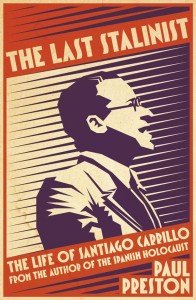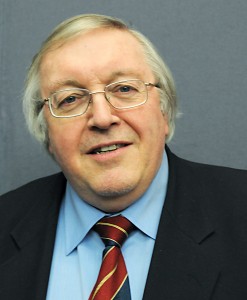Mind-boggling lies: Preston on Carrillo
Preston’s revealing exposé of Carrillo’s ruthless rise to power within the Party—a career strewn with lies, crimes, and betrayals—destroyed the positive image that Carrillo had managed to build in the wake of the democratic Transition, and to maintain until his death in 2012, at 97. I spoke with Preston in the summer of last year, as he was correcting the final proofs for the Spanish edition.
Is your critique of Carrillo particularly harsh because it’s coming from the Left?
“There will be people on the right who say: Even left-wing historian Paul Preston criticizes Carrillo. I knew him and liked him but I ended up indignantly concluding that he undermined the struggle against Franco. By imposing unrealistic strategies, and destroying those who criticized him, he squandered the efforts and sacrifices of the hundreds of thousands of people who suffered under and against the dictatorship.”
How do you explain the transformation of his image over the past quarter century?
“He left politics in 1985, but he lived for another thirty-seven years—years that were used to build up an image of him as an utterly wonderful character who always had the national interest at heart. It is true that Carrillo played a very important role in the transition to democracy, by presenting the Communist Party as extremely moderate. And clearly, Carrillo’s role during the night of the February, 1981 military coup is commendable. His own explanation of what he did—one of the three people in parliament who did not hide under their desks when Tejero and the others started shooting—is one of the few moments where I find him credible. He said he was sure he was going to die, and he did not want people to say that the leader of the Communist Party died as a coward. If I am going to be shot, he thought, I might was well be shot sitting up rather than lying down.
“But what that positive image of Carrillo as some sort of national treasure hides, is the viciousness with which he rose to power and the dirty tricks he did on comrades. And the lies are just mind-boggling. As you read the material you can’t help thinking, Oh, for God’s sake! Let me give you an example. Carrillo’s great obsession in exile was the Huelga Nacional Pacífica, the pacific national strike, or HNP. He stuck to this against everybody’s advise, especially that of Claudín and Semprún, and he did so with great damage to the militants in Franco Spain. Well, in an interview with Rosa Montero from the late seventies, he actually says: We wouldn’t have insisted so much on the HNP if it hadn’t been for Claudín—when in fact he got rid of Claudín for criticizing it!”
Is your critique of Carrillo a critique of the Left in general?
“A good part of my book is how Stalinist practice ended up undermining the Communist Party. But that doesn’t mean that I would remotely draw the conclusion that the Left as a whole was corrupt or flawed. I still believe that, overall, Communist policy during the Civil War was the only sensible one. And Carrillo during the war actually does a very good job as a leader as the United Socialist Youth (JSU), which is what provides the bulk of the rank and file of the Republican forces.”
You yourself lived part of this history.
“The reason I was able to finish this book in relatively quick time is because in a sense it’s a book I’ve been thinking about for forty years. I worked as an interpreter for the Junta Democrática in the late 1970s, I knew Carrillo and knew a lot of the protagonists quite well. My role was what they would call a tonto útil, a useful fellow traveler. The people I was closest to at that time all have ended up hating Carrillo’s guts. Everybody turned on him, because he had already turned on everyone else.”















